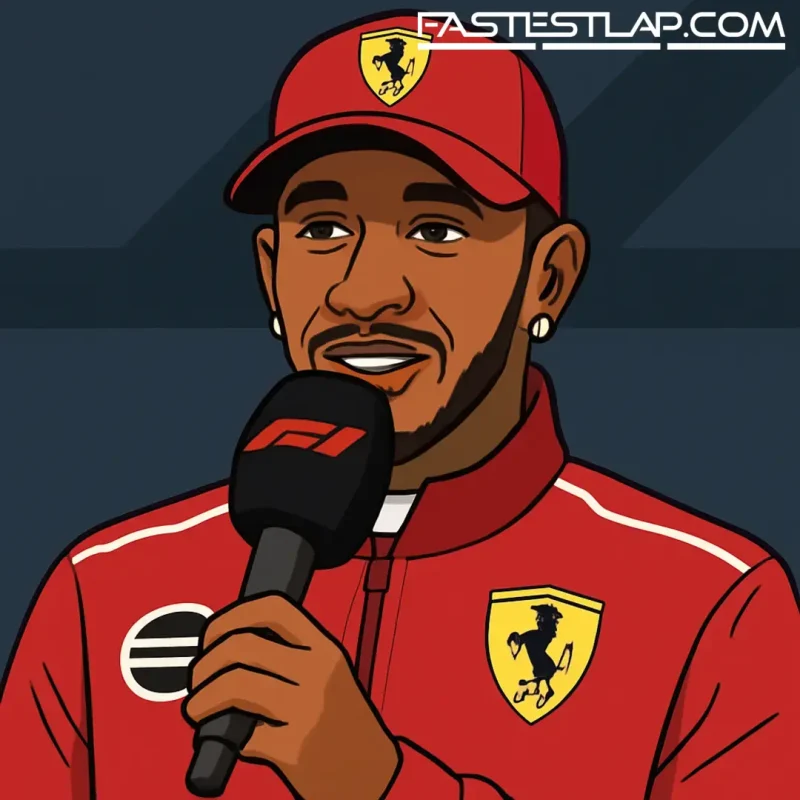Ralf Schumacher tells Hamilton to “own” Baku Q2 exit after Ferrari tyre misfire
Lewis Hamilton arrived in Baku sounding every inch a pole threat. Ferrari locked out the top of Friday practice with Hamilton leading Charles Leclerc, and for a beat it looked like the Scuderia had the measure of the place. Then qualifying unraveled, and Hamilton was out in Q2, fuming about tyres.
The seven-time champion pointed the finger at Ferrari’s call to keep him on softs, arguing the medium was the faster route. “The medium was just much quicker,” he said afterwards, noting that the field in the top 10 “basically had three mediums” left while he didn’t. Leclerc, meanwhile, made Q3 but ended it in the barrier.
Cue Ralf Schumacher, who wasn’t in the mood for sympathy. Speaking on Sky Deutschland’s Backstage Boxengasse podcast, the former Williams man said Hamilton, of all people, can’t hide behind a strategy sheet. In Schumacher’s view, if the medium was the tyre to be on, Hamilton should’ve planted his flag.
“He has to take the blame himself,” Schumacher said, arguing that a driver with Hamilton’s weight and experience has the authority to dictate the call when it matters. He even reached back to the Mercedes years, suggesting a cultural hangover might be at play — the old Toto Wolff line about engineers deciding and drivers driving. “Lewis needs to assert himself and stop searching elsewhere for the mistake,” Schumacher added. “That’s what you expect from a seven-time World Champion.”
It’s a pointed take, but not an outlandish one. The best drivers do often bend the room. Fernando Alonso, Max Verstappen, prime Sebastian Vettel — when they wanted a compound, they got it. Hamilton’s own career is full of moments where he’s overruled the pit wall and been right. That’s partly why the frustration carries an extra sting: if he was convinced the medium would be the ticket, why not slam the table and go medium?
Ferrari’s stance, publicly at least, was that the soft would cover more scenarios as Q2 evolved, and that Hamilton’s medium set could be banked for Q3. That plan fell apart when he didn’t make it. Leclerc was supposed to run the medium on his second Q2 attempt, Hamilton said, but when the rest of the field stuck with softs, Ferrari blinked and did the same. The irony, of course, is that most of those who progressed then went into Q3 sitting pretty on mediums.
Once the damage was done, Hamilton started 12th and hauled it to eighth at the flag — almost ninth. Late on, Ferrari radioed for him to cede position to Leclerc before the line, a tidying-up of strategy that Hamilton didn’t execute in time. The team later labelled that call a misjudgement; the optics weren’t great either way.
For all the noise, this wasn’t some existential crisis at Maranello. Hamilton’s speed in practice was real, Leclerc’s pace in Q3 before the crash was sharp, and the SF-25 had a window where it looked like the car to beat. But weekends swing on inches in 2025, and Ferrari managed to find all the wrong ones in under an hour.
Schumacher’s criticism cuts to a broader point about how Hamilton and Ferrari are still learning each other. Ferrari operate with a slightly different cadence to Mercedes; Hamilton’s instincts are still tuned to silver, not red. As that relationship settles, you’d expect the balance between driver feel and pit-wall caution to tilt more in his favour. It has to, if Ferrari want to convert promising Fridays into meaningful Sundays.
There’s a flip side too: Hamilton’s arrival was supposed to give Ferrari precisely this — an uncompromising voice when the pressure is hottest. If Baku is a lesson in anything, it’s that Hamilton’s clout only works if he spends it. Next time he’s certain about a tyre, he’ll need to make it non-negotiable.
For now, the scoreboard shows an eighth place that should’ve been ninth, a Q2 exit that should’ve been a fight for pole, and a weekend that hinted at a lot more than it delivered. The car’s quick. The driver’s still got it. The calls, though, need to be sharper — from both sides of the radio.




